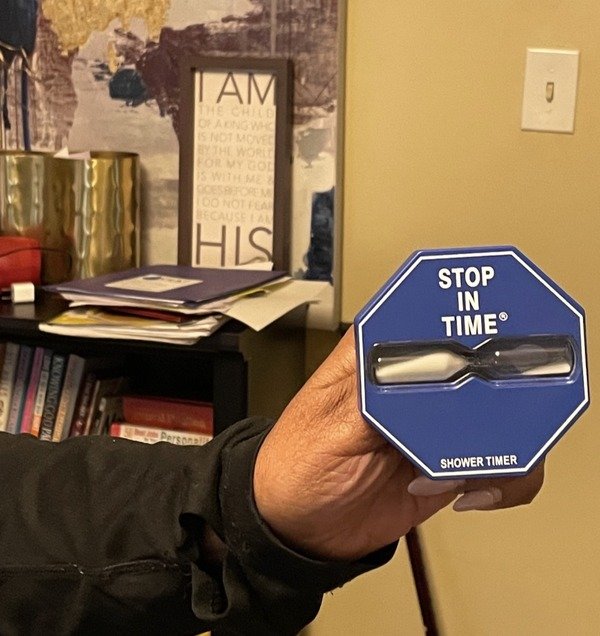Water Timing
I recently got a photo from a friend that I cannot get out of my mind. It is a picture of a shower timer given out to people when they sign up for the city’s Lifeline Plan. The plan is based on a fixed monthly rate and limits water usage. When you sign up, you are warned that usage is limited. The shower timer is your reminder.
This limitation on water usage was one of the features most widely criticized. Families must stay below a 4,500 gallon limit a month or they would be penalized by higher rates, almost triple what they were originally guaranteed. Currently about 28% of homes use more than the allotment.
Gary Brown, who heads the Detroit Water and Sewerage Department and the Mayor vigorously denied they were setting up a system of water rationing. They argued that the average three-person household used between 2,300 and 3,000 gallons a month, so there was no need for concern. In cases where water usage was above this level, Brown asserted it was probably due to leaky pipes. He assured critics the department was looking for funds to help with infrastructure issues as well.
Yet this little egg timer stuck in the middle of a blue stop sign tells a very different tale. It reveals the kind of callous, insensitive and logic defying approach that the city administration has taken to the water crisis.
Coming out of the moratorium on water shut offs enacted during the pandemic, nearly 60,000 households are again threatened with shut offs. That is nearly one third of the city, with the average household debt for water utility expenses being $700. One of the reasons for this is that one in ten households spend more than 25% of their income on water.
About 100,000 households are eligible for this Lifeline program, but only 14,000 have applied. This poor response reflects the distrust people have in this administration. Nothing encompasses the administration’s attitude more than its little blue shower timer. It speaks to the view that people who have limited incomes are somehow less capable than others. It is the same view that the city is expressing in court as it resists legal efforts to extend the moratorium on shut offs. Attorneys for the city argue that people need the threat of service interruption as an “incentive” to encourage them to pay their water bills.
This attitude is more than reactionary. It denies a real understanding of the depth of the crisis we face and the critical need to redefine how we think about caring for each other. A water affordability plan, based on the idea that water is a human right and a sacred trust, acknowledges that we are all connected to one another, we all have a stake in each other’s well-being. Such a plan has long been advocated in the city by the People’s Water Board Coalition and We the People of Detroit. It has been enacted as a model idea in progressive cities across the country.
While we await court decisions, sidestepping by the city, and the handing out of water-rationing devices, there is some hope at the state level. A bill sponsored by State Senator Rosemary Bayer, a democrat representing Beverly Hills, would declare water a human right and require agencies to “employ all reasonable means” to make that vision a reality. Senator Stephanie Chang of Detroit has a series of bills designed to protect access to safe, affordable water and the democratic majority is making efforts to increase state spending on infrastructure bills.
Instead of handing out timers, the city administration needs to step back. It is time for a new understanding of who we are and who we want to become.

